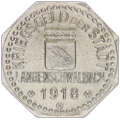Wieso heißt es Uhrwerk Orange?
Woher kommt dieser Begriff für das Buch den Film? Was bedeutet der Name Uhrwerk Orange.
2 Antworten

Der Autor des Buches scheint sich nicht entscheiden zu können ^^
Burgess has offered several clarifications about the meaning and origin of its title:
- He had overheard the phrase "as queer as a clockwork orange" in a London pub in 1945 and assumed it was a Cockney expression. In Clockwork Marmalade, an essay published in the Listener in 1972, he said that he had heard the phrase several times since that occasion. He also explained the title in response to a question from William Everson on the television programme Camera Three in 1972, "Well, the title has a very different meaning but only to a particular generation of London Cockneys. It's a phrase which I heard many years ago and so fell in love with, I wanted to use it, the title of the book. But the phrase itself I did not make up. The phrase "as queer as a clockwork orange" is good old East London slang and it didn't seem to me necessary to explain it. Now, obviously, I have to give it an extra meaning. I've implied an extra dimension. I've implied the junction of the organic, the lively, the sweet – in other words, life, the orange – and the mechanical, the cold, the disciplined. I've brought them together in this kind of oxymoron, this sour-sweet word."[16][17] Nonetheless, no other record of the expression being used before 1962 has ever appeared.[18] Kingsley Amis notes in his Memoirs (1991) that no trace of it appears in Eric Partridge's Dictionary of Historical Slang.
The saying "as queer as ..." followed by an improbable object: "... a clockwork orange", or "... a four-speed walking stick" or "... a left-handed corkscrew" etc. predates Burgess' novel.[19] An early example, "as queer as Dick's hatband", appeared in 1796,[20] and was alluded to in 1757.[21]
- His second explanation was that it was a pun on the Malay word orang, meaning "man". The novella contains no other Malay words or links.[18]
- In a prefatory note to A Clockwork Orange: A Play with Music, he wrote that the title was a metaphor for "an organic entity, full of juice and sweetness and agreeable odour, being turned into a mechanism".[18]
- In his essay Clockwork Oranges, Burgess asserts that "this title would be appropriate for a story about the application of Pavlovian or mechanical laws to an organism which, like a fruit, was capable of colour and sweetness".[22]
- While addressing the reader in a letter before some editions of the book, the author says that when a man ceases to have free will, they are no longer a man. "Just a clockwork orange", a shiny, appealing object, but "just a toy to be wound-up by either God or the Devil, or (what is increasingly replacing both) the State."
This title alludes to the protagonist's negative emotional responses to feelings of evil which prevent the exercise of his free will subsequent to the administration of the Ludovico Technique. To induce this conditioning, Alex is forced to watch scenes of violence on a screen that are systematically paired with negative physical stimulation. The negative physical stimulation takes the form of nausea and "feelings of terror", which are caused by an emetic medicine administered just before the presentation of the films.[citation needed]

Ein kryptischer Titel, entlehnt aus dem Londoner Lokalslang.
Orange steht wohl für den Menschen als organisches, fehlerbehaftetes Lebewesen. Evtl. abgeleitet vom malaysischen Wort Orang für Mensch (Wikipedia-Artikel zum Roman) oder (nach meiner Interpretation) zu verstehen als "verderbliche Frucht".
Uhrwerk spielt sicherlich auf die moderne Gesellschaft und Arbeitswelt an, in der der Mensch funktionieren muss ("jeder Mensch lebt wie ein Uhrwerk, wie ein Computer programmiert", so auch eine Liedzeile im Song "Hier kommt Alex" von den Toten Hosen, der auf den Roman Bezug nimmt).
Der Konflikt zwischen dem menschlichen Deliquenten und den Erwartungen der Gesellschaft, die ihn schließlich zu einem konformen Bürger umerzieht, ist Thema des Romans.